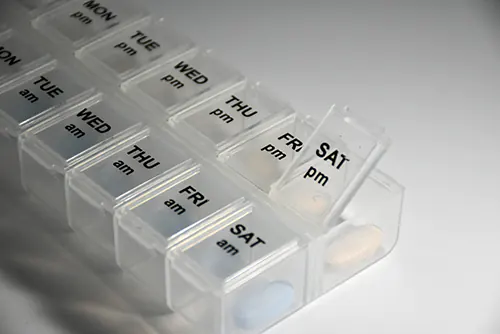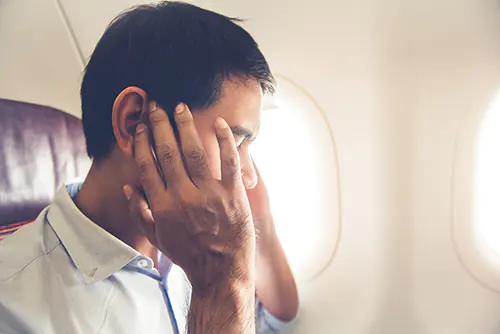Travel Well is healthcare designed for patients traveling both interstate and overseas
Travelling can expose a person to not only an unfamiliar environment but illnesses as well. Travel medicine is healthcare designed to protect and treat patients before and after travelling whether it’s interstate or overseas.
Speaking with a General Practitioner prior to departure can easily reduce the risk of being exposed to a serious illness uncommon in their country of residence.
her MEDICAL will educate and help improve the quality and enjoyment of travelling by providing individualised health advice on:
- Vaccines
- Pre-travel physical exam
- Medications
- Overcoming jetlag
- Prevention of DVT
- Motion sickness
- Safe sex
- Required documentation
Vaccines

Vaccines
her MEDICAL is an accredited YELLOW FEVER VACCINATION facility
Whether travelling overseas for business or pleasure, her MEDICAL onsite doctors are here to help with having a safer and worry-free travel experience.
The Australian Department of Health and Aged Care recommends that travellers have appropriate immunisation for travel to places with an increased risk of being exposed to a disease as a result of contaminated water, food, infected people, cuts, and insects or being bitten by a native animal.
Vaccines protect travellers from these risks of contracting a disease. Different countries also require different vaccinations and/or a booster if already vaccinated.
There are a number of factors that depend on what vaccines are recommended and required including:
- Age
- Pregnancy or planning pregnancy
- Underlying medical conditions
- Vaccination history
- Location of travel
- Season of travel
her MEDICAL recommends seeing a General Practitioner between 6 to 8 weeks prior to departure to develop full immunity and whether several doses of a vaccine are required.
Vaccinations can prevent contracting any of the following:
- COVID-19
- Hepatitis A
- Hepatitis B
- Influenza
- Japanese encephalitis
- Meningococcal disease
- Rabies
- Tuberculosis
- Typhoid
- Varicella (Chickenpox)
- Yellow fever
- Cholera
- Measles
Preventative Pre Travel Physical Exam

Preventative Pre Travel Physical Exam
Know your health status to avoid health risks & complications on your trip
her MEDICAL believes that planning prior to travelling can prevent unforeseen health issues on your journey. A pre-travel physical is a precautionary measure to review your overall general health, your fitness and what activities to avoid.
A physical assessment before departure is highly recommended should a patient suffer from any pre-existing conditions including:
- Heart disease
- Stroke
- Diabetes
- Cancer
- Asthma
- Autoimmune disease
- Existing allergies
- Recent surgery
This is also important and recommended for pregnant women.
Medicines and medical devices

Medicines and medical devices
It is important to consult with a General Practitioner prior to travelling to discuss any medications currently being taken and any required medical devices.
Not all countries allow certain medications, especially without a doctor’s prescription or certification. It is recommended to check The Therapeutic Goods Administration (TGA) in Australia for additional information on travelling with medicines.
Prescriptions from Australia generally cannot be filled overseas so it is very important that you have enough medication for the duration of your trip.
her MEDICAL onsite doctors provide peace of mind about taking medications on your travels and can provide accompanying documentation required for medication that is prescribed.
Overcoming Jetlag

Overcoming Jetlag
Getting to the destination is generally fun, the jet lag, not so much.
The body is synchronised to night and day by the action of sunlight through brain chemicals or neurotransmitters, especially melatonin.
Jet lag is a disruption of the body’s circadian rhythm that occurs with plane travel across three or more time zones. There is no cure for jet lag, but its effects can be reduced with planning.
Symptoms of jet lag
- Fatigue
- Sleepiness
- Digestive upsets
- Headache
- Impaired judgement and decision making
- Memory lapses
- Irritability
- Apathy
Minimising the impact of jet lag
The key to getting over jet lag is to get your body’s circadian rhythm aligned with the sunrise and sunset schedule at your destination. The best way to reset your sleep/wake cycle is to go outside into the sunlight and do some exercise.
We’ve listed a few strategies to help you with your adjustment to jet lag.
Pre-flight:
- Ensure a good sleep before departure
- Adjust your sleep schedule
- Having a stopover on a long-haul flight may help
During the flight:
- Avoid alcohol and caffeinated drinks
- Drink a lot of water
- Try to sleep whenever you feel sleepy
- Eat small meals often
- Walk around the cabin as much as possible
- Wear an eye mask
In your new time zone:
- If you have travelled eastward, get some sunshine in the early morning and if you have travelled westward, aim for sunlight in the evening
- Make sure you keep the room as dark as possible when you try to sleep at night
- For the first few days, take short naps to help you stay more alert
- Make sure you nap for no more than 30 minutes, and that you are awake for at least 4 hours before bedtime
- Try to mimic your usual bedtime routine
- Use relaxation techniques
The body needs anywhere from a few days to a few weeks to acclimatise to the new time zone. As a general rule, it takes about a day to recover for each time zone.
Prevention of DVT

Prevention of DVT
Deep vein thrombosis (DVT) is a blood clot that forms in the deep veins of the leg. It is a rare but dangerous medical problem which occurs when blood in the legs clots. Serious problems occur when the clot dislodges from the leg and moves towards the heart or lungs.
Long periods of immobility, especially during long-distance travel, is associated with an increased risk of DVT.
Travellers who are at higher risk of developing DVT, include the following:
- Having a history of thrombosis
- Family history of abnormal clotting
- Being overweight or obese
- Pregnant
- Having a history of cancer
- Certain medications
- Smokers
- Aged 40 or older
- Varicose veins
- Recent surgery
The following may be helpful to reduce the risk of DVT:
- Drink plenty of water
- Avoid alcohol, cigarettes, and caffeine
- Regularly move around the cabin and once you have arrived at your destination
- Do calf and foot stretches while travelling
- Wear compression stockings
- Wear loose clothes
- Do not cross legs while travelling
Book an appointment with your doctor before you travel if you have concerns about developing DVT.
her MEDICAL can identify any risk factors and advise on what measures should be taken into consideration.
Motion Sickness

Motion Sickness
Motion sickness is a common problem that anyone can get from any type of transport including cars, trains, buses, boats or planes.
Motion sickness is a general unwell feeling with nausea being the main symptom.
Symptoms include:
- Sweating (hot & cold)
- Dry mouth
- Vomiting
- Dizziness & feeling light-headed
- Headaches
- Pale skin
- Inability to walk
- Persistent retching
- Irritability
Some of the symptoms may last for a few hours following the end of the journey despite the absence of the motion but generally resolve on their own.
The following tips may help with motion sickness:
- Do not travel on an empty stomach
- Drink plenty of water
- Choose carefully where you sit on aircraft, buses or trains
- Try to keep your head and body as still as possible during turbulences, take-off and landing
- Choose your cabin carefully if on a cruise, boat or ship
- Reading may increase the chances of experiencing motion sickness
- Access fresh air, air conditioning or open an air vent to stay cool
Natural Remedies that may help:
- Ginger
- Mint and lavender aromatherapy
- Acupressure and using an acupressure band or bracelet
Motion sickness medications are also sold over the counter at local chemists and pharmacies.
Safe Sex

Safe Sex
Engaging in safe sex while travelling and on holiday is essential to your health!
Contracting an STI while on holiday can be a burden while travelling and many times, there are no symptoms present in a sexual partner during the time of intercourse. While symptoms may not be present, STI’s are passed through bodily fluids and can have a long-term effect on any one individual including infertility.
STI checks are recommended for individuals who engaged in unsafe sex during their travels and every 3-6 months for people with multiple partners.
Most STI’s can easily be treated with antibiotics while others have no cure and will need to be diagnosed, treated and managed for the remainder of one’s life.
Documentation
her MEDICAL can provide appropriate medical documentation and certifications that may be required to have while travelling to overseas destinations.
Medications
It is wise to carry copies of prescriptions for medication required to be taken by the person travelling stating the purpose of the medication being taken, its importance to the person’s health and that the medication is for personal use.
Pregnant Women
Pregnant women may require a medical certification authorising the individual is safe to travel along with their due date.
Please be advised most airlines do not permit a pregnant woman to fly internationally after 36 weeks and after 32 weeks if the mother-to-be is expecting multiple births.
Pacemakers
Patients with pacemakers are also advised to have medical documentation and certification on hand to present should any issues arise especially during screening prior to boarding.
Medical conditions
Having previously diagnosed medical conditions may flare up during travels and is also a good idea to have documentation and medical certification on hand in case of an emergency while travelling.
Vaccines
Many destinations now require verification of vaccination, especially since the Covid-19 pandemic and must be presented prior to departure.
All travellers
It is always a good idea to have basic medical supplies on hand while travelling.
A travel medical kit recommended by the RACGP should include:
- First aid ointment
- Paracetamol
- Insect repellent
- Antinauseant
- Antacids / laxatives
- Pseudoephedrine/antihistamine
- Bandaids / gauze / alcohol swabs
- Gastro kit with rehydration solutions